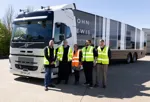Karl Howkins, managing director of SOGO
Flexibility is the key to resilience.
Flexibility will be the defining requirement for small fleets over the next decade.
Advances in data and technology have enabled mobility providers to build a service around the need of the small business in real-time.
The technology allows an accurate view of the customer and their requirements and allows for the right vehicle to be provided at the right time.
It’s a view that has driven the development of the SOGO offer which is setting new benchmarks for the industry in its ability to meet the needs of the customer in real-time.
Lease terms have trended downward over the last decade, with smaller businesses and PCH customers taking vehicles over 12 and 24-month leases in ever-increasing numbers.
The logical progression of the trend is the ability to use a vehicle on a month-to-month basis, around changing seasonal demand or staffing needs.
Covid-19 has accelerated existing trends and driven businesses to take a profound look at every area of their business.
Employees are working more flexibly often in compressed hours over shorter weeks.
The need for office space is being redefined as more people work from home and the UK has seen a marked shift from field to inside sales as the days of salespeople crisscrossing the country come to an end.
As a new mobility provider, the team at SOGO had the luxury of starting with a blank piece of paper, it presented the opportunity to redefine what leasing should look like for a small business.
Long-term vehicle leases look as archaic as taking a 10-year lease on an office. As the pace of business increases, so must the companies that support the entrepreneurs.
As part of the mobility solution, it became increasingly important to make accessing mobility as easy as ordering a new iPhone, and it should be as close to a one-click experience as possible.
With this in mind, it becomes necessary to offer insurance and servicing in the monthly cost.
The iphonication of the fleet industry will grow in the coming years.
Both business owners and consumers expect a product or service to be available immediately, and the service to be exceptional.
Social media and digital review boards will push the fleet industry to evolve quicker than ever before.
Building a deep understanding of the customer will help to create new opportunities to provide additional services.
It is a simple business model, but one that requires a fundamental shift in our industry from an infrequent, light-touch relationship to a richer partnership.
Technology and data will empower the business owner and fleet manager to make informed decisions about their fleet needs, and getting it right has never been more important.
Giving hard-working teams the correct vehicles they need to operate effectively is vital. It also fuels staff satisfaction and retention.
Digital disruption is affecting all industries, and it was only a matter of time before technology was deployed to drive out cost and increase efficiency in the fleet sector.
There is no doubt the UK fleet industry is facing challenges in the coming years; from the ongoing issues from the pandemic to Brexit and fundamental shifts in the vehicles we drive, how they are powered and owned.
It’s a truism that great service builds strong business relationships.
All fleet companies and the customers they serve will see the way they work transformed in the next few years.
At the heart of these changes is building resilience into the DNA of how it all works.



















Login to comment
Comments
No comments have been made yet.